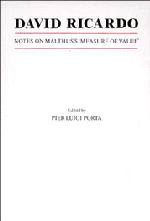Introduction
Published online by Cambridge University Press: 21 May 2010
Summary
The origin of Ricardo's Notes
The Measure of Value Stated and Illustrated With an Application of It to the Alterations in the Value of the English Currency Since 1790 by Thomas Robert Malthus appeared in print in April 1823. Soon after its publication, Ricardo recorded a critical reaction in a letter to Malthus of 29 April: ‘After the most attentive consideration which I can give to your book, I cannot agree with you in considering labour, in the sense in which you use it, as a good measure of value.’ Malthus's sense is the quantity of labour commodities will command as opposed to the quantity of labour which is employed upon them. With this statement Ricardo's correspondence reverted to the discussion of value after over two years' interval, the measure of value becoming the dominant issue in his letters during the summer of 1823, the last months of his life. Reading Malthus's pamphlet, therefore, marked the beginning of a new train of reflection on a problem which had preoccupied Ricardo in particular during the latter half of 1820, while he was revising his own Principles for the third edition published in the spring of 1821, and while, at the same time, he was also compiling his extensive commentary on Malthus's Principles.
Information
- Type
- Chapter
- Information
- David RicardoNotes on Malthus's 'Measure of Value', pp. ix - xxiiPublisher: Cambridge University PressPrint publication year: 1992
Accessibility standard: Unknown
- 2
- Cited by
